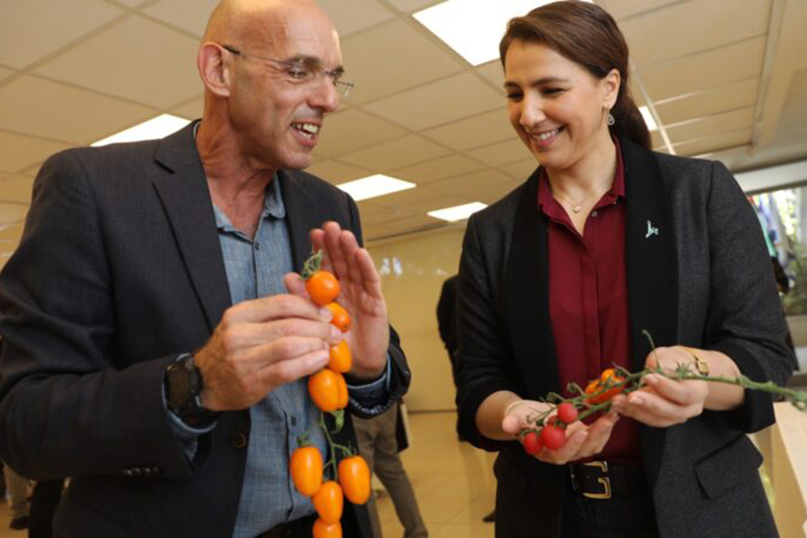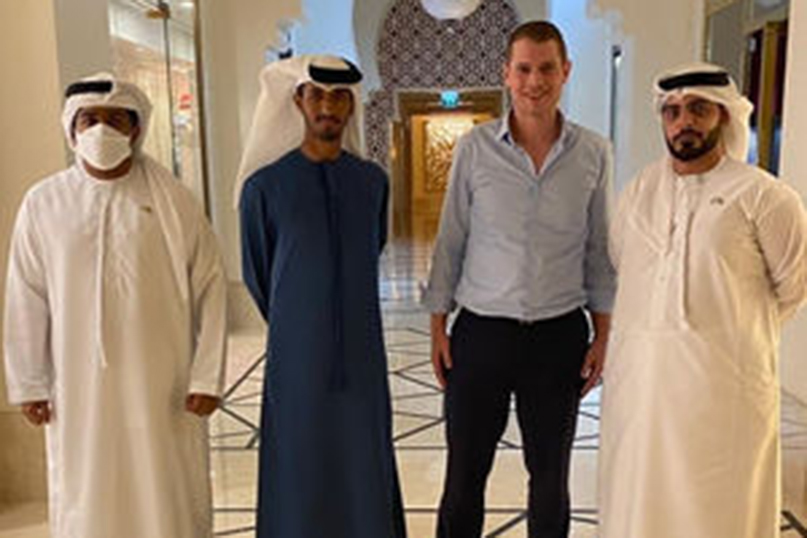
By Abigail Klein Leichman
(Israel21c) On Aug. 13, 2020, an extraordinary event transformed the Middle East: Israel and the United Arab Emirates signed a joint statement of intent to normalize diplomatic relations.
Formalized at the White House in September, the historic Abraham Accords opened wide a door that seemed hopelessly shut between the two countries.
True, discreet business had been conducted between Israelis and Emiratis for years, and Israelis holding foreign passports had quietly entered Dubai and Abu Dhabi.
But the Abraham Accords changed the game, with direct flights and direct phone calls linking businesspeople, government officials and ordinary citizens who’d long been curious about one another.
Every day brought another “first” between Israel and the UAE.
In October, Etihad Airlines launched a Hebrew-language website to help Israeli travelers book reservations. Thousands of Israeli tourists flooded the UAE until COVID-19 put a temporary stop to that.
The flurry of activity following the Abraham Accords spanned everything from an Israeli lingerie ad shoot in Dubai to ambitious collaborations in agricultural and medical research.
Israel’s Central Bureau of Statistics reported that between September 2020 and June 2021, Israel exported $197 million worth of goods to the UAE and imported $372 million worth of goods from the UAE.
Groups formed quickly to foster connections. Among them are the Abu Dhabi-Israel Business Hub, UAE-Israel Business Council, Israeli-Emirati Forum, UAE-IL Tech Zone, Gulf-Israel Women’s Forum and Gulf-Israel Green Ventures.
$10 billion investment fund
“We are very happy to see the collaboration between our nations continuing to bud and prosper,” says UAE-IL Tech Zone advisory board member Ahmed Nasser al-Nowais, founder & CEO of Abu Dhabi-based Annex Investments.
One of the most remarkable results of the Abraham Accords was the March announcement of a $10 billion UAE investment fund earmarked for the Israeli energy, manufacturing, water, space, health-tech and agri-tech sectors.
“The investment fund will promote economic cooperation between our nations, deriving from government, semi-private, as well as private institutional money. This will allow for technological integration and implementation between our nations, as well as spurring innovation through joint investments,” said al-Nowais.
Dubai-based investor and fund manager Dorian Barak, cofounder of the UAE-Israel Business Council, estimates that nearly $500 million in business was conducted between Israel and the UAE in the first year following the Abraham Accords.
“You’re going to find Israeli businesses setting up companies in the UAE to use it as a base for targeting commercially the greater Middle East,” said Barak.
Many opportunities are arising in Gulf and Far East nations, added high-tech veteran Gilad Carni, founder and CEO of the UAE Israel Innovation Office, a for-profit venture facilitating business between the UAE and Israel.
“In the past, big Israeli players were able to sell to these countries by opening a company in Europe, but today even smaller companies without the financial ability to open offices in Europe can do this through UAE distributors,” said Carni.
For example, Carni’s office got an Israeli construction-tech company involved in a tender for a multimillion-dollar project in a country Israel does not have relations with, and brokered a deal to sell dates to an Asian country that Israel does not have ties with, all via the UAE.
Building relationships
“There’s a lot going on businesswise,” said Carni, although the pace of splashy announcements is slower as the work of implementation goes on behind the scenes.
Israelis have learned that deals will not progress at the speed to which they are accustomed.
“Israelis tend to fly out to a business meeting and then go home. Emiratis are all about relationships. You’ll go to dinner, meet their families, talk about anything other than business, to build the personal relationship first,” said Carni. “It takes time, but if you’re there for the long run it pays off.”
Personal relationships are a primary goal of the Israeli-Emirati Forum, says founder Asher Fredman.

Credit: Gulf-Israel Green Ventures.
About 120 businesspeople, officials, academics and students from both countries communicate regularly through the forum on WhatsApp, Zoom and, when possible, in person.
“It’s a place for people to share and build trust. We are creating the bonds between people that will help us overcome periods of tensions that will certainly come,” said Fredman.
“The forum has been, and I hope will be even more so, a springboard for collaboration in all fields – in business, innovation, culture, education, and interfaith dialogue.”
When Israel decides the pandemic situation allows for reopening its borders to UAE visitors, Carni expects a flood of business travel on the three-hour route to Tel Aviv.
“I have a list of UAE businesspeople just waiting to get on a plane and come here and build those relationships,” he said.
Genuine and heartfelt
Abdulla Baqer is one of those Emiratis waiting to get on a plane.
The president of the UAE-Israel Business Council, and director of Endemaj Funds global investment and advisory house, Baqer wants to come to Israel for a month to learn its culture.
“I’ve had many invitations,” he told participants in a Zoom event marking the June 14 opening of the United Arab Emirates Embassy in Tel Aviv.
The UAE, he said, is the region’s top trade and financial hub, while Israel is the regional leader in technology and innovation.
“We have the world’s two most dynamic economies. A lot of experience can be transferred between the two countries for the benefit of both and for the whole world. Everything is possible if we sit together and have a dialog and understand each other,” said Baqer.
Fellow speaker Yoel Guzansky, a senior research fellow at the Institute for National Security Studies in Israel, said strong personal connections and religious openness will ensure the durability of the Abraham Accords.
“With Egypt we don’t have connections between the people. It’s a different model with the UAE, a language of tolerance. But beyond words, the UAE is taking actions such as building a synagogue/mosque/church complex and changing some of the wording in textbooks,” said Guzansky.
Barak, of the UAE-Israel Business Council, says he was surprised at how openly Emiratis embraced Israelis.
“This wasn’t just governmental; this has really become a people-to-people peace that is genuine and heartfelt,” he said.
Food security, logistics, healthcare
Baqer and Guzansky pinpointed food security, healthcare, investment and finance, education, logistics, security and defense as areas where the Abraham Accords can be a gamechanger for the Middle East and beyond.
A recent example of healthcare cooperation is a July 11 memorandum of understanding (MoU) between the Department of Health-Abu Dhabi and Sheba Medical Center in Israel to collaborate on advancing medical research, healthcare and telemedicine services, sharing knowledge and best practices, and positioning Abu Dhabi as a prominent destination for medical tourism.
Baqer mentioned a cargo logistics company under development by the UAE and Israel.
“It will be the Uber of logistics. All the big companies like FedEx, DHL and Emirates Airlines will use our facilities because it will be cheaper and faster,” he predicted. “This will boost the economy and create a lot of jobs for both countries.”
In the area of food security, Carni’s office matched an Israeli agri-tech company with an Emirati project to grow rice in the desert.
Academic cooperation
Joint academic agreements are a key area of cooperation, Guzansky said.
“This didn’t receive proper attention in the media but it’s important. Academic agreements can enhance people-to-people and economic and government cooperation,” he said.
Some examples:
• Mohamed Bin Zayed University of Artificial Intelligence and Israel’s Weizmann Institute of Science will establish a joint virtual institute for artificial intelligence and begin student and postdoctoral-fellow exchange programs, conferences and seminars.
• UAE Minister for Food and Water Security Mariam Almheiri and UAE Ambassador to Israel Mohamed Al Khaja spoke at Ben-Gurion University of the Negev at a July 14 ceremony establishing the Moshe Mirilashvili Center for Food Security in the Desert.
“We are interested in becoming a global player on food and water security policy,” Almheiri said. “We have access to 2 billion consumers through our ports and airlines and you have the technology. We would love to import your spirit of entrepreneurship to our youth.”
Almheiri discussed a food-tech and agri-tech research partnership with Hebrew University leaders. Among the hot topics are plant adaptation to heat and desert-like conditions, smart water management and high-quality seed and food production in the face of climate change.
• The Moshe Dayan Center for Middle Eastern and African Studies at Tel Aviv University and TRENDS Research and Advisory Center in Abu Dhabi plan cooperative projects in geopolitics, economy and intercultural relations.
• TRENDS also signed an agreement with the University of Haifa following an international symposium led by the university’s Ezri Center of Maritime Policy and Strategy. University President Prof. Ron Robin is well acquainted with Emirati culture; he lived in Abu Dhabi for eight years when he was Senior Vice Provost for Global Faculty Development at New York University.
• An Israeli-Emirati Water Research Institute will open in Abu Dhabi through a strategic collaboration between Israeli water-from-air technology company Watergen and UAE company Baynunah, in cooperation with the Moshe Mirilashvili Institute for Applied Water Studies at Tel Aviv University. Watergen and Baynunah are building a Watergen production facility in the UAE.
• In May, private Israeli university IDC Herzliya welcomed Israel’s first full-time Emirati student, Mansoor bin Shamekh al-Marzooqi, who is studying for a bachelor’s degree in government. Many more are expected to follow.
Sami Bashir, director of technology management and innovation at Khalifa University’s Khalifa Innovation Center in Abu Dhabi, told a meeting of the UAE-IL Tech Zone that his office is “finalizing several collaborations with [university] tech-transfer offices in Israel” and invited Israeli students to “come and visit if you want to validate your business models in our incubator.”
Early-stage startups
While joint ventures and technology exports are flourishing in the wake of the Abraham Accords, early-stage Israeli startups have largely been left out of the picture.
“Emiratis are not huge investors in early-stage technologies,” said Barak.
“When the normalization started in August, a lot of Israelis went to Dubai to semi-vacation and semi-check out business possibilities with the hope of meeting rich locals and raising money,” said Carni.
It turned out that Emiratis didn’t want to throw money at Israeli startups. New founders got the message and stopped asking.
As Carni notes, “Israeli businesses are getting plenty of capital without the Emiratis anyway.”
Indeed, the first half of 2021 saw Israeli high-tech startups raising a record $11.9 billion.
Startups that successfully scale up over the next few years are likely to find that they didn’t miss their chance in the UAE.
Emirati officials and businesspeople, Carni explained, think strategically about “where they want to be in five, 10, 20 years” and will look for Israeli companies strongly positioned to help them meet those goals.
This article was first published by Israel21c. Naama Barak contributed to this report.
Main Photo: Hebrew University Agriculture School Dean Benny Chefetz and UAE Minister for Food and Water Security Mariam al-Muhairi talk tomatoes in Rehovot. Photo by Yossi Zamir.







 Southern New England Jewish Ledger
Southern New England Jewish Ledger













